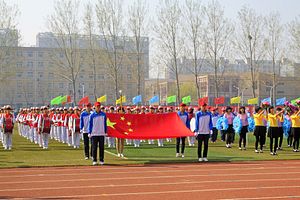Arguably the most influential people in the world of sports are FIFA President Issa Hayatou, Olympic Committee President Thomas Bach, International Cricket Council CEO Dave Richardson and NFL Commissioner Roger Goodell. These men oversee the four most widely watched sporting events on the planet.
Other contenders are ESPN Executive Chairman George Bodenheimer, Nike CEO Mark Parker, and, as of quite recently, Wanda Group owner Wang Jianlin. Wanda is currently China’s largest real estate developer and the world’s largest cinema operator, and according to a report last week by The Australian Financial Report, it will soon be the world’s largest sports company as well.
Wanda has already purchased the Ironman Triathlon for $650 million and plans to bring the event back to China. Before triathletes rejoice, they should bear in mind that the reason the Ironman has been discontinued in China for the past five years is because China failed to meet the brand’s quality standards. Hopefully its return signals more than a change in the owner’s nationality.
Wanda has also acquired a 20 percent stake in the Spanish football club Atlético de Madrid, which Forbes lists as the 16th most valuable football club in the world (at $436 million). It has announced the construction of a billion-dollar sports facility in Guangzhou. It recently bought InFront Sports and Media, which televises the FIFA World Cup and represents all seven Olympic winter sport federations. And there are rumors that it plans to purchase the three big tours of cycling — the Giro d’Italia, the Vuelta a España and the Tour de France.
Wanda’s burgeoning sports empire reflects China’s growing sports presence in general. It ranked fourth overall in the 1996 Olympics, third in the 2000 Olympics, second in the 2004 Olympics, and first in the 2008 Olympics. China also currently ranks seventh on the all-time Paralympic Games medal table. Also, these days there are many more globally recognized Chinese athletes, such as badminton champion Lin Dan, retired NBA player Yao Ming, track star Liu Xiang, and the greatest female tennis player in Asia, Li Na.
As a gymnast, I’ve long admired China’s athletes (the finest gymnasts are often Russian, American, Japanese, or Chinese), but I’m also concerned that China’s growing presence might not be entirely beneficial. I’m reminded of a boxing competition I once attended in Kunming years ago, during my first trip to China.
Each match pitted a Chinese fighter against a foreigner. There was a Vietnamese boxer, a Cambodian boxer, a Muay Thai fighter, a Muay Lao fighter, a South Korean taekwondo fighter, and, for the main event, a Japanese “heavyweight” boxer (both competitors looked like welterweights to me).
And, surprise surprise, the Chinese fighters won every single fight. Before the final bout someone delivered a speech and a group of scantily-clad foreign women performed a dance (they were, of course, white and did not, of course, actually know how to dance). The bell rang and the Japanese fighter went down with a single punch. I remember that my Israeli friend smiled at my naïve disbelief as he related to me that such things weren’t so strange in China.
Along with its growing sports prowess, China is getting a less desirable reputation as a cheater. At the 2000 Olympics the gymnast Dong Fangxiao was stripped of her bronze medal when it was discovered that she was actually fourteen, two years below the age minimum. China was accused of pulling the same trick at the 2008 Olympics, with three gymnasts instead of one, but despite government documents the charges were dropped when Beijing produced the athletes’ passports (as if such documents couldn’t be forged).
It’s not just boxing matches or Olympic events either. At the 2010 Xiamen Marathon, one-third of the contestants cheated — some rode cars, others hired impostors to run the race for them. Malcolm Moore, of The Telegraph, noted incidents at the 2006 Ethnic Minority Games, in which a male team wore wigs to compete in the women’s dragon boat race; a Yunnan Provincial Games in which 110 athletes faked their ages; and a youth diving competition in which divers were given zero points by judges who coached rival teams.
“Putting gold above all else … has warped the spirit of sports,” China Sports Minister Liu Peng said in September, addressing rampant cheating in sports. His remarks came after two scandals, involving a member of China’s Olympics committee and China’s volleyball chief.
But pointing out that China isn’t exactly cementing a reputation for fair play doesn’t suggest that it’s among the world’s worst offenders. According to a November 2015 independent commission report, China and the United States each had fewer than ten anti-doping rule violations in 2013, whereas India had 30, Russia had more than 40, and Turkey had over 50.
As Chinese athletes and business owners continue to sound out their country’s place in the world of sports, greater competition will only bring good things.

































